I have experimented with cynicism quite a bit the last 5 years.
OMF was my cynical training ground.
If I have slapped you and your beliefs and convictions around, this was why.
Awww, did I hurt your feelings and threaten your precious convictions

Good!
I was only talking to one person really, Dan, I pushed him to delete all my posts.
I gave it my own spin.
People often use the word “cynic”, for someone bitter, distrustful, and pessimistic. However, in ancient Greece, cynicism was an important school of thought that promoted an anti-materialistic way of life.
One of my heroes is Diogenes, he lived with the dogs, as I do.
"The Cynic School was founded by Antisthenes (445–360 or 444–368), son of an Athenian and a slave from Thrace, who was a distinguished warrior and a student of the sophist Gorgias. The school was founded in Kynosarges of Athens, and it was the only school in the city that accepted non-Athenian citizens.
A lot of philosophers, such as Aristotle (in Nicomachean Ethics, Eudemian Ethics), Homer, Plato, and Socrates, considered Virtue (Αρετή) to be an important factor to be happy.
For cynics, (Kyon, meaning dog in ancient Greek, κύων), virtue is considered to be the ultimate goal, and to achieve this, you have to neglect anything that doesn’t help you gain virtue and happiness. Cynicism has been also characterized as an anti-philosophy, which mocks intellectualism, and tries to prove that common sense beats complex theories.
Goods were distinguished into two categories, the external (property, physical pleasure, luxury) and the internal. To the latter belongs the pre-eminent demand of the philosophers, that is, the secure knowledge of Truth and Self. However, “Virtue” doesn’t depend on knowledge, but it is a result of practice and dedication."
I concur mostly and have practiced the old Cynicism and developing personal virtue.
"Diogenes of Sinope (400-325 BC) was a student of Antisthenes and he is, without a doubt, the most popular cynic. His opinion was that true virtue would be revealed by one’s actions and not his theories. He was against materialism, he lived in a large ceramic jar(πυθάρι), and his goal was to provoke people to get closer with their nature.
Diogenes often criticized social values and believed that society was corrupted, confused, and alienated from its nature. He was the first person to declare himself as a “cosmopolitan” and a citizen of the world, instead of claiming allegiance to just one place — for example, Sinope or Athens, where he lived as a free man."
There are no known writings of Diogenes. The only details from his life are taken from some anecdotes, for example, the famous meeting with Alexander the Great in Corinth.
When Alexander the Great met Diogenes, who was resting in his ceramic jar, he asked him if there was anything he could do for him. Diogenes responded, “Αποσκότησόν με,” which means “ Stand out of my sunlight”.
Alexander then said,
“If I were not Alexander, then I should wish to be Diogenes.”
Another known fact about Diogenes is that he despised Plato, and he believed that Antisthenes was the real successor of Socrates. When Plato defined the human as “featherless bipeds”, Diogenes plucked a rooster, showed it to Plato, and screamed
“Behold! I brought you a human!”
Diogenes lived as he pleased, and believed in human’s independence and self-sufficiency (αυτάρκεια). He acted as he pleased, but also he spoke with free will, honesty, and courage (παρρησία), and was willing to forgo personal pleasures in the pursuit of finding inner peace and virtue.
The true goal of the cynic is to know their nature better.
And this is why I adopted this practice and have found that it works quite well.
It doesn't make you many friends.
I have no nation or group, I am a human being.
Diogenes was looking for human beings, not right wingers or left wingers, human beings.
My religion is being a human being.
I think I have kept quite well to the Cynic intent.
This age needs Cynics, not critics, Cynics.
"Cynicism in its true meaning didn’t disappear after Diogenes’ death, but lived throughout the philosophical school of Stoicism. Stoicism’s core idea is to live a life where you have self-control.
Through self-control, people can tame their destructive emotions — like anger, or even hope. Hope for Stoicism is a terrible feeling, because people have to be ready to face the worst scenario and be pessimistic, instead of hoping for the best."
I can't say I agree here with the stoics, I think we have to live in between dread and hope.
"The reason why we have two ears and only one mouth is so we might listen more and talk less — Zeno of Citium.
Stoicism and Cynicism are both based on practice. To live a virtuous life, you have to live according to nature. However, there are some main differences. Stoics don’t necessarily agree with the intentional refusal of obeying social conventions, even if those are irrelevant to finding virtue. They tend to live a more easy-going life than cynics, who attack materialism by denying anything unnecessary in bonding with nature."
I like the more easy going approach myself, so I am not a true cynic I guess. Go with the flow, sometimes you are up, sometimes down, accept it all.
Love it all.
"Cynic philosophy has been a point of interest for many philosophers. Modern philosopher Michel Foucault had written about the ancient cynics in his topic
“Le courage de la vérité.”
Ludwig Wittgenstein has also referred to cynics, while Slavoj Zizek has been considered to be influenced by Diogenes’ cynicism.
Friedrich Nietzsche is another philosopher that has been heavily influenced by cynicism, following a philosophy of skepticism and self-discipline.
However, we can surely say that no other philosopher in modern society has ever practiced cynicism in the sense that Diogenes of Sinope practiced it. The journey to find true virtue by ignoring every materialistic value has been toned down, but it still exists."
You don't know the true cynics, our culture has made sure their voices are not heard, or it would undermine the greed of materialism that gives others power over us.
Once you are part of the elite, your cynical tools are blunted.
One must live with little to practice this lost art.
I'll add, one does not need to deny themselves please, just learn to live on what they need, which doesn't mean a pure ascetic life.
This still gives you some credibility in the materialist system. You show you can take care of yourself and be a benefit to others and maintain your cynical edge to challenge the elite with.
Dan is of the elites and I eviscerated him with great glee.
But all things in moderation I say.
One must take time to remove their masks or we risk anger and hatred and violence.
"Nevertheless, some of the eccentric actions of Diogenes (for example, pissing all over some man he did not like, or masturbating in public) would get him arrested in today’s society. But that’s another topic.
By the 16th century, renaissance writers were emphasizing the negative aspects of Cynic philosophy. This was one of the main reasons that led to the modern understanding of cynicism.
Nowadays, a cynic is a person who has a distrust of people’s apparent motives and ambitions or has a pessimistic approach to life, and sarcastic, offensive behavior."
Smelly is certainly offensive and sarcastic, though I have toned him a down a bit.
"In today’s world, the word “cynic” is used to describe a hypocritical and negative person, proving that the word has completely lost its original meaning. In the last thirty years, the word cynic has been used by a lot of journalists to describe politicians who use manipulative and shady tactics.
According to William Chaloupka, writer of “Everybody Knows: Cynicism in America”, the solution to bad cynicism is politics. Good cynics provoke us to vote, contribute money, and participate in politics in unselfish ways. Democracy requires cynics to challenge and make fun of the elite. Therefore, the notorious negativity of modern cynicism can be used as a valuable tool."
The comic today is possibly a true cynic I feel, if they are smart enough and disciplined enough to realize themselves.
This is why they are so vulgar, it is part of the cynical act, but to forget this is just being vulgar.
There is an art and skill to good cynicism.
How many comics of great promise flamed out due to self destruction?
It is a hard road.
George Carlin was an excellent Cynic and born for his time.
Hopeful idealists must become Cynics imho in our day and age.
The elite are getting away with terrible abuses of the common human.
The Cynic stands up for nature in the face of evil naked materialism.
Smelly Goat is my Cynical act, but I mostly perform my act here on OMF.
My sword that can cut through any intellectual knot.
You all are sick of me, I'm sure, but I feel I have been a good natured cynic really.
If I have cussed you, it was only for emphasis.
I wasn't being a clown, well, a good clown is a good cynic.
I don't think anyone really got my joke.
Well, a few did, who are friends now.
I am a Disclosure cynic to be sure.
I suppose that was part of my learning the art and skill of good cynicism.
I still and will always have a cynical thread and will bash the intellectual when I can.
I practice my cynicism on myself first and most.
All the forces the conservative and elite see eroding order, are ultimately a check against moving too far from nature.
We become decadent and sick when we say too far from our nature, our will.
It will correct you.
It could be argued, if nature made us, anything we do, is based on the evolution that created us.
But we are not just muppets with no will.
How great if it was that simple.
Life would be absurd if so.
Life is not absurd, what we make of it often is.
We have the power to reflect and choose.
This makes you god in a way.
This skill must be practiced and honed.
Essence and existence battle it out here.
The Zen are excellent cynics, which is why I practice Zen.
This is why this is the best of all possible worlds.
So we can learn to choose.
For what ultimate end?
I would only be speculating to say, though I have hints of why this is the way it is.
One of the paradoxes of life is that to be happier you don’t have to get more stuff or do new things. You only have to live the life you already have and be more fully present in it.
Once you master this, have it all, for then you will know what is really valuable and meaningful in life.
I live a modest life with a few luxuries.
I don't have to blow my or anyone else's life up to practice my art.
When I was reborn into my life, it was as a cynic of conspiracy and politics and religiosity.
What you do matters, not so much what you think. It is so easy to think nonsense, like eating candy, so one should spend time with human beings, who are always close to nature, who learn that candy is really a poison. Everything has positive and negative aspects, amplified by the nature of one's choice.
Master yourself and make yourself great.
Practice the ancient art of Cynicism on yourself and the flood of nonsense in the world to know the real world and your nature.
Another arrow in your quiver.
A very good article imho. You can verify the historical points if you like, I have.
Now you have a little more insight into the modern Cynic, Smelly Goat.
I may take my act on the road yet.
I have just been warming up.
https://medium.com/exploring-history/diogenes-and-cynicism-in-modern-society-49acac80a81e
BTW, I have never been spirited on OMF, though it may have come off as such, ever.
Not one fool has really moved me or beaten me.
They could only join me or resist.
Resistance is futile.
To resist me is to resist nature and you can't really resist it.
Cause none of us are getting out of here alive, going to live in space pods or upload ourselves into machines or escape into the future or past through wormholes or getting beamed up by this or that faction of being.
That's just all more resistance.
The cynic is the antidote to the eschatologist.
"There are four reasons why the Cynics are so named. First because of the indifference of their way of life, for they make a cult of indifference and, like dogs, eat and make love in public, go barefoot, and sleep in tubs and at crossroads. The second reason is that the dog is a shameless animal, and they make a cult of shamelessness, not as being beneath modesty, but as superior to it. The third reason is that the dog is a good guard, and they guard the tenets of their philosophy. The fourth reason is that the dog is a discriminating animal which can distinguish between its friends and enemies. So do they recognize as friends those who are suited to philosophy, and receive them kindly, while those unfitted they drive away, like dogs, by barking at them."
Bark
Bark
Bark
None of this meant that a Cynic would retreat from society. Cynics were in fact to live in the full glare of the public’s gaze and be quite indifferent in the face of any insults which might result from their unconventional behaviour. The Cynics are said to have invented the idea of cosmopolitanism: when he was asked where he came from, Diogenes replied that he was “a citizen of the world, (kosmopolitês).”
The ideal Cynic would evangelise; as the watchdog of humanity, they thought it their duty to hound people about the error of their ways. The example of the Cynic’s life (and the use of the Cynic’s biting satire) would dig up and expose the pretensions which lay at the root of everyday conventions.
Although Cynicism concentrated primarily on ethics, some Cynics, such as Monimus, addressed epistemology with regard to tuphos (τῦφος) expressing skeptical views.
Cynic philosophy had a major impact on the Hellenistic world, ultimately becoming an important influence for Stoicism. The Stoic Apollodorus, writing in the 2nd century BC, stated that “Cynicism is the short path to virtue.”
























» What Music Are You Listening To ?
» Livin Your Best Life
» Uanon's Majikal Misery Tour "it's all smiles on the magic school bus"
» WRATH OF THE GODS/TITANS
» CockaWHO!?
» Scientists plan DNA hunt for Loch Ness monster next month
» OMF STATE OF THE UNION
» Earth Intelligence